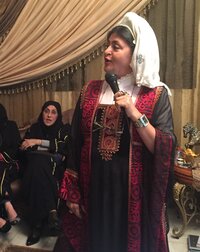After Historic Elections in Saudi Arabia, What’s the Future for Women?
By NPR StaffAfter Historic Elections in Saudi Arabia, What’s the Future for Women?
By NPR Staff
In municipal council races in Saudi Arabia a week ago, 21 female candidates were elected to office. In the country’s third-ever elections, the monarchy gave women the right to vote, as well as to seek election to office.
Nearly 1,000 women ran throughout the country, but while there were 1.36 million men registered to vote, according to the Wall Street Journal, only 130,000 women could vote.
NPR’s Rachel Martin and Marisa Peñaloza traveled to Saudi Arabia ahead of the election to find out how women were reacting to their new rights and how they’ve been living.
One candidate’s view

Haifa Alhababi is an architect and university teacher. She also was one of the women vying for a spot on one of the municipal councils.
“First of all, I was curious to know what’s happening.
“Like, I went to the balloting workshop … if it’s like, really beneficial or if it’s like, because I have this idea from living abroad that this is about, this is a major step, and who runs here?
“But for myself I don’t want to be, like, a politician — I’m not a politician, I’m an architect. So I wanted just to be sure. Is it work like outside, or its something different here? So thank God that I went to this workshop and I realized that it’s more about local issues that we really face.”
Alhababi, who had studied abroad in the U.K. and who also had lived in Texas for some time, said the country’s standing in the world is not where some would like to hope.
“I always said that they call us ‘developing country’ because we have the oil — but we are not a developing country, we are still a third-world country,” she said. “So to deal with this mentality, to deal with these people, to deal with this system here, you need to work on the ground, not just to lecture and say words and that’s it.”
Alhababi is optimistic about her generation’s future.
“I believe that we’re gonna create change,” she says. “When you experience, try something, live it, you understand. So you want to apply it to your country. No one hates their country — when you come back and live, that means you love your country, so you want to make it better.
“What’s happening now, for me, it’s not about male and female, it’s about the changing conception of people — that they try to understand that they should participate in their community. They should understand that, without your participation, the country won’t go any further.”
What else do Saudi Arabian women need?

After returning to the U.S., Martin spoke with Hatoon al-Fassi, a professor of women’s studies at King Saud University in Riyadh. Fassi happened to be in Washington, D.C., and Martin asked her to reflect on the significance of the Saudi elections.
Despite the continued obstacles in campaigning, and even registering to campaign, Fassi says the results of the municipal elections offer reason for optimism.
“Now you have women who are in the public eye for the first time, where they have to deal with real issues of their community,” Fassi says. “I believe that these local positions are very important. Women could change many discriminatory rules that deals with women’s financial status, women’s health, women’s well-being.”
And even if it’s a small victory, Fassi says, it’s a crucial one — and one that should be savored.
“This is a good moment of reflecting on the victories. And it gives me hope that change can happen in my lifetime.”
— via NPR